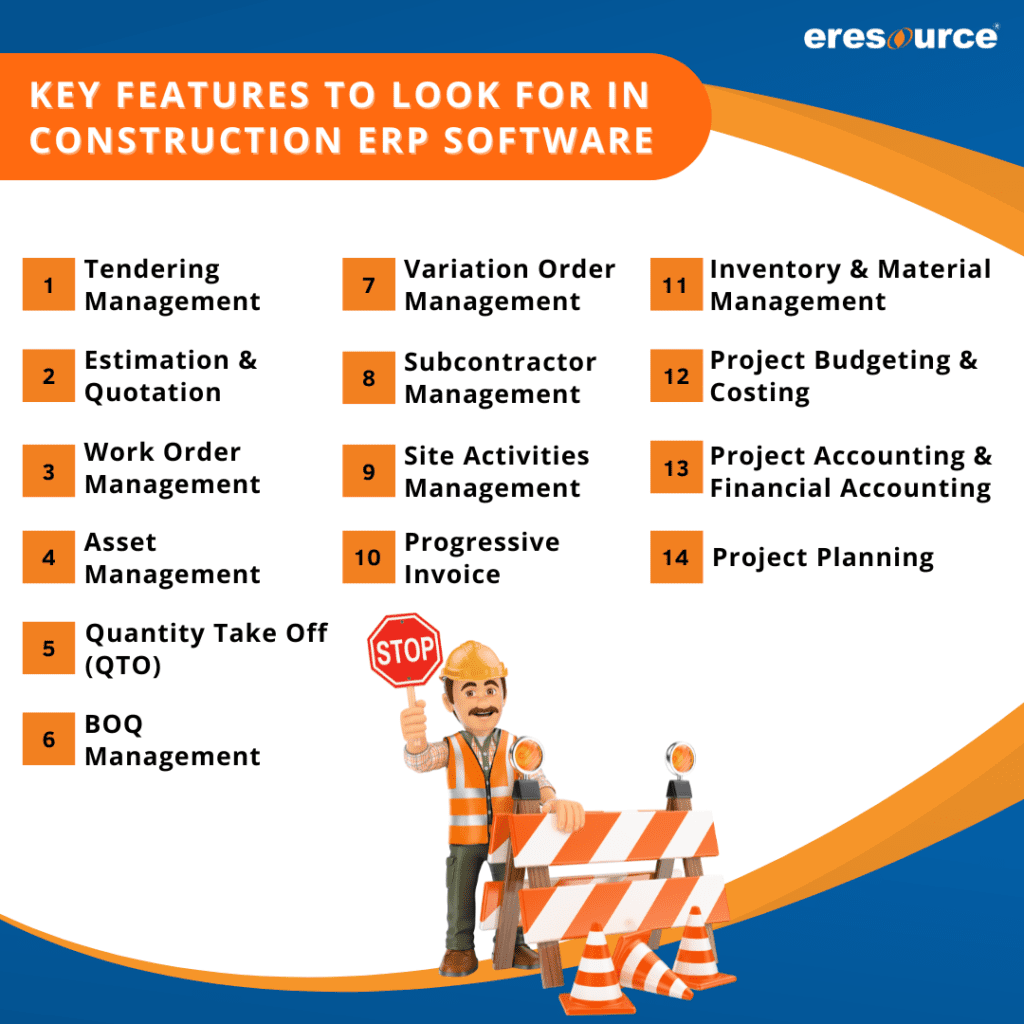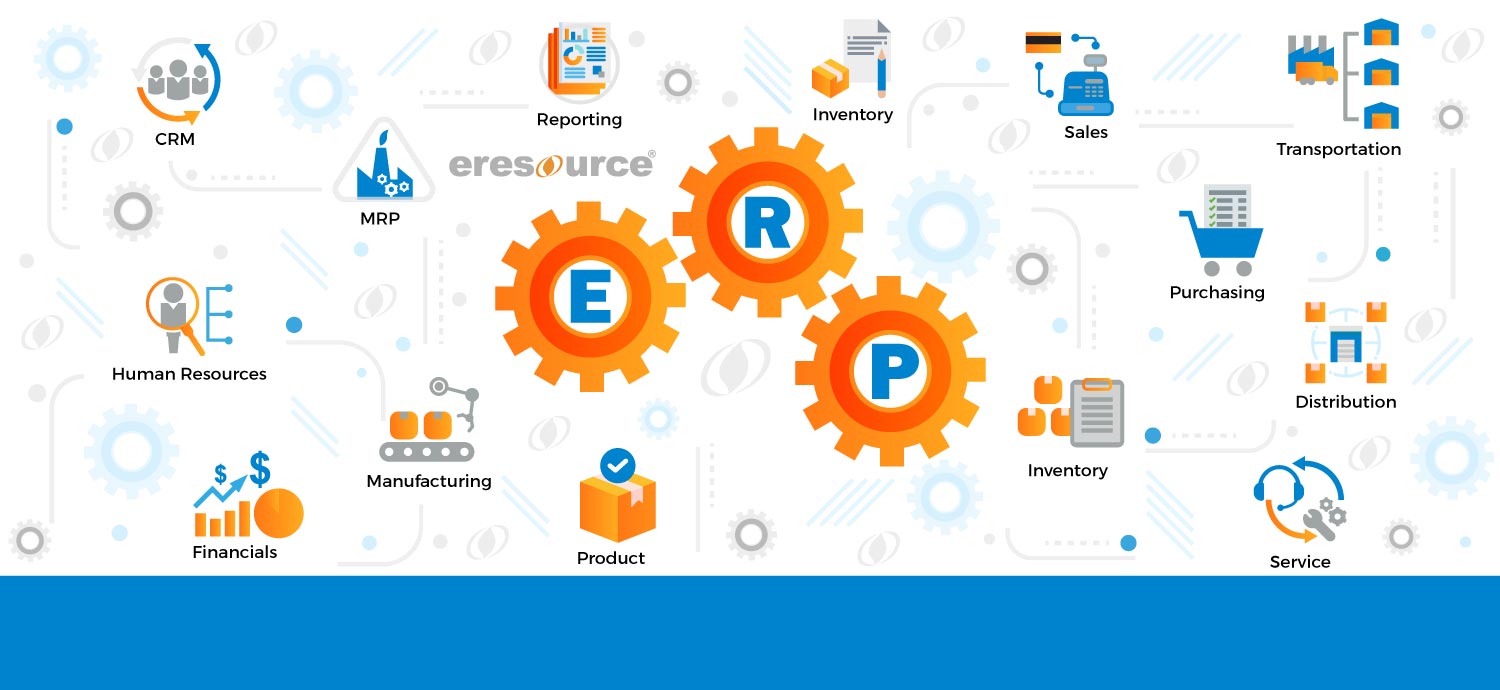In the construction industry, the dynamic nature of projects demands a specialized approach to management, and selecting the right ERP software is crucial for success. A construction ERP system should be designed exclusively for the construction and contracting industry, ensuring that it addresses the unique challenges faced by construction companies. When evaluating an ERP solution, it’s important to choose a product that is not only tried and tested but also backed by a history of successful implementations. At eresource, our ERP solution has been successfully deployed across numerous construction companies, enabling them to achieve operational excellence.

Here are the key features that any robust Construction ERP should include:
BOQ Management
The Bill of Quantities (BOQ) Management module is essential for the meticulous planning of construction projects. It accurately lists all the materials, labor, and parts required, ensuring that every resource is accounted for. This module allows construction companies to create precise estimates and avoid over or under-purchasing, leading to efficient resource allocation and cost savings. With comprehensive itemization, the BOQ Management module reduces the risk of errors and omissions, providing a solid foundation for project execution.
Tendering Management
Tendering Management streamlines the complex process of creating and managing tenders. This module ensures that all necessary documents are prepared with precision and submitted on time, eliminating delays and administrative bottlenecks. It also helps track the status of tenders and manage bid submissions, providing a clear overview of the tendering process. By automating tender management, construction companies can improve their chances of winning bids and optimize the tendering process for better outcomes.
Estimation and Quotation
Accurate estimation is the cornerstone of any successful construction project. The Estimation and Quotation module allows construction companies to generate precise project estimates based on industry best practices. This module takes into account various factors such as material costs, labor, and other resources, ensuring that quotations are competitive and reflective of actual project requirements. With this module, companies can confidently bid on projects knowing that their estimates are both accurate and comprehensive.
Work Order Management
Work Order Management is crucial for ensuring that construction tasks are completed efficiently and on schedule. This module facilitates the creation, tracking, and management of work orders, ensuring that all tasks are assigned to the appropriate teams and monitored for progress. It also plays a key role in managing subcontractors, helping to coordinate their activities and ensure that they meet project deadlines. By centralizing work order management, companies can maintain control over project execution and avoid costly delays.
Quantity Take Off (QTO)
The Quantity Take Off (QTO) module is vital for accurately determining the quantities of materials needed for a project. By creating detailed QTO documents, this module helps construction companies reduce waste, minimize costs, and ensure that the right materials are available when needed. The QTO module also supports efficient procurement processes by providing accurate data that can be used to order materials in the correct quantities, reducing the risk of shortages or excess inventory.
Project Budgeting and Costing
Effective financial management is key to the success of any construction project. The Project Budgeting and Costing module provides the tools needed to create detailed budgets, track actual costs, and perform variance analysis. This module helps construction companies stay within budget by providing real-time visibility into project finances, allowing for timely adjustments and cost-saving measures. With accurate budgeting and costing, companies can improve profitability and avoid financial pitfalls.
Project Planning
The Project Planning module is designed to help construction companies create and manage project schedules, ensuring that all tasks are completed on time and within budget. This module provides tools for tracking progress, identifying potential delays, and making adjustments to keep projects on track. With effective project planning, companies can optimize resource allocation, reduce the risk of delays, and ensure that projects are delivered on schedule.
Variation Order Management
Changes to the scope of work are common in construction projects, and the Variation Order Management module is essential for managing these changes effectively. This module ensures that all variations are documented, approved, and reflected in the project budget. By managing variation orders efficiently, construction companies can maintain control over project costs and avoid disputes with clients or subcontractors.
Subcontractor Management
Managing subcontractors is a critical aspect of construction project management. The Subcontractor Management module helps construction companies track subcontractor agreements, monitor progress, and ensure compliance with contractual obligations. This module also facilitates payment management, ensuring that subcontractors are paid on time and according to the terms of their contracts. With effective subcontractor management, companies can improve collaboration and ensure that all parties are aligned with project goals.
Inventory and Material Management
The Inventory and Material Management module is crucial for ensuring that the right materials are available when needed. This module helps construction companies manage inventory levels, track material usage, and ensure timely ordering and delivery. By optimizing inventory management, companies can reduce the risk of material shortages, minimize waste, and improve overall project efficiency.
Site Activities Management
Managing activities on a construction site can be challenging, but the Site Activities Management module makes it easier. This module tracks and manages all site activities, ensuring that tasks are completed on time and within budget. By providing real-time visibility into site operations, this module helps construction companies identify potential issues and take corrective action before they escalate, leading to smoother project execution.
Progressive Invoice
Cash flow management is critical in construction, and the Progressive Invoice module helps by generating invoices based on the completion of specific project milestones. This module ensures that payments are made on time, improving cash flow and reducing financial strain. By automating the invoicing process, construction companies can ensure that they receive payments promptly and maintain healthy financial operations.
Asset Management
Effective asset management is key to maximizing the utilization of equipment and tools on a construction site. The Asset Management module helps construction companies track the location, usage, and maintenance of assets, ensuring that they are used efficiently and remain in good condition. This module also helps companies plan for asset replacement or upgrades, reducing the risk of downtime due to equipment failure.
Project Accounting and Financial Accounting
The Project Accounting and Financial Accounting module is essential for managing the financial aspects of a construction project. This module tracks income and expenses, manages budgets, and ensures compliance with accounting standards. By providing accurate financial data, this module helps construction companies make informed decisions, improve financial performance, and ensure that projects are completed within budget.
In addition to these features, the ideal Construction ERP should be built on the latest technology, be web-based, scalable, and flexible. The ERP should leverage a Low Code/No Code framework to allow for easy customization and rapid deployment. Agile implementation is essential for adapting to the dynamic nature of construction projects. Moreover, having an inbuilt messaging system for notifications, like the one provided by eresource ERP, ensures that all stakeholders are kept informed and up-to-date throughout the project lifecycle.
Categories
Register for Free Demo!
Recent Post
-

eresource ERP 360 - an
11th Apr 2019 -

A competitive ERP system for
17th Apr 2019 -

Auto components manufacturing industry has
17th Apr 2019 -

Make the best use of
17th Apr 2019







